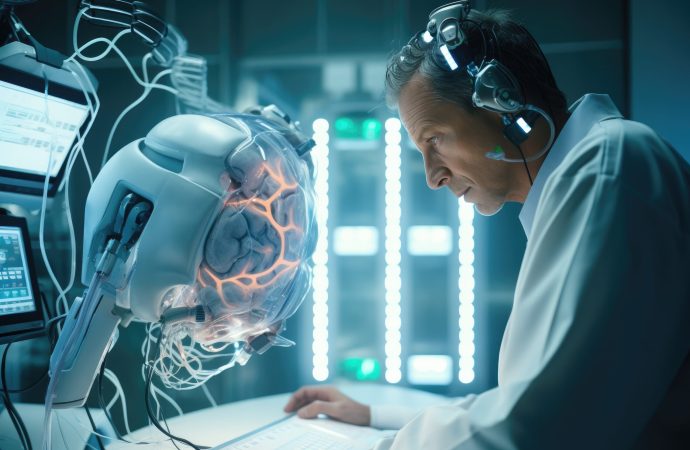Exploring the Intersection of AI and Healthcare: As a professional in the healthcare industry, I have witnessed the transformative potential of Artificial Intelligence (AI) in healthcare. The intersection of AI in Medication has brought about revolutionary changes in the way we diagnose, treat, and manage diseases. AI, with its ability to learn and adapt, is
Exploring the Intersection of AI and Healthcare:

Image by : Yandex
As a professional in the healthcare industry, I have witnessed the transformative potential of Artificial Intelligence (AI) in healthcare. The intersection of AI in Medication has brought about revolutionary changes in the way we diagnose, treat, and manage diseases. AI, with its ability to learn and adapt, is capable of analyzing vast amounts of data and extracting meaningful insights, which can significantly enhance the quality of healthcare services.
AI has a pivotal role in revolutionizing Medication treatments. It is transforming the way healthcare professionals approach diagnosis and treatment, making it more precise, efficient, and personalized. From predictive analytics to robotic surgery, AI is reshaping the healthcare landscape by enabling Medication providers to deliver better patient care and improve patient outcomes.
How AI is Revolutionizing Patient Care and Treatment:
AI is enhancing precision in patient diagnosis and treatment. It can analyze medical images, identify patterns in patient symptoms, and even predict disease progression. This allows Medication professionals to make more accurate diagnoses and devise more effective treatment plans. AI-powered tools can also provide real-time monitoring and alert healthcare providers of any significant changes in a patient’s condition, enabling early intervention and reducing the risk of complications.
AI is playing a crucial role in revolutionizing patient care. It is driving advancements in healthcare treatment by enabling personalized medicine, improving patient engagement, and enhancing patient experience. AI-powered virtual assistants, for instance, can provide personalized health advice, reminders for medication, and even mental health support. This not only enhances patient care but also enables Medication providers to focus on more complex tasks.
The Roadblocks to AI Adoption in the Healthcare Sector:
Despite its immense potential, the adoption of AI in Medication is not without challenges. One major roadblock is the ethical implications of AI. Issues such as data privacy, consent, and accountability are significant concerns that need to be addressed. There is also the question of how decisions made by AI systems can be explained and understood, especially when they involve critical health decisions.
Another significant barrier to AI adoption in Medication is the lack of technical skills. AI requires a high level of technical expertise to develop, implement, and manage. Many Medication organizations lack the necessary technical skills and resources to effectively leverage AI. This underscores the need for more investment in AI education and training in the healthcare sector.
AI in Healthcare: A Look Ahead:

Image by : Yandex
Looking ahead, I believe that the implications and benefits of AI in Medication will continue to grow. AI has the potential to transform healthcare treatment methodologies, making them more efficient, effective, and personalized. It can enable predictive healthcare, where diseases can be prevented or treated at an early stage, thereby improving patient outcomes and reducing healthcare costs.
The role of AI in Medication will continue to evolve, driven by advancements in technology and increased understanding of its potential and limitations. As we continue to harness the power of AI, we can look forward to a future where healthcare is more personalized, proactive, and patient-centric.
Real-world Examples of AI Making a Difference in Healthcare:
AI is already making a significant difference in Medication. It is revolutionizing diagnosis and treatment procedures, enhancing patient care, and reducing healthcare costs. For instance, AI-powered tools are being used to analyze medical images and detect diseases such as cancer at an early stage. This not only improves patient outcomes but also reduces the burden on healthcare professionals.
AI is also helping to reduce Medication costs. AI-powered predictive analytics can help healthcare organizations identify high-risk patients and intervene early, thereby reducing hospital readmissions and associated costs. Furthermore, AI can automate routine tasks, freeing up healthcare professionals to focus on more complex and critical tasks.
Conclusion:
In conclusion, AI is ushering in a new era of treatment in Medication. While there are challenges to its adoption, the potential benefits of AI in healthcare are immense. As we continue to explore the intersection of AI and Medication, we can look forward to a future where healthcare is more efficient, effective, and patient-centric.
















